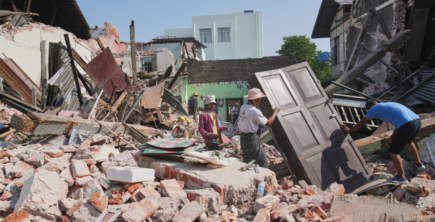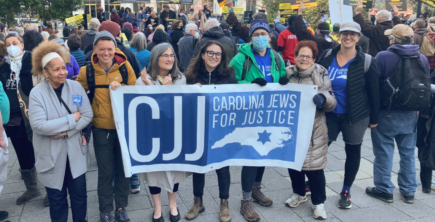
Healthy Individuals & Communities

Across America, innovative leaders and organizations are working to ensure longer, healthier lives for Black communities. From groups like Mothering Justice, which amplifies the voices of mothers of color to shape policy, to Queens Village, which centers Black women to shift the conditions that drive disparities in maternal and infant health, to Southern Sector Rising, which advocates for communities impacted by pollution and environmental injustice, community-led organizations stand in the gap to defend the fundamental right to health. This Black History Month, as we celebrate the achievements of the African American community and Black diaspora across the world, we at Tides are calling on our community to invest in Black futures by supporting Black health equity.
This work is urgently needed: racism and inequality in America’s past and present have caused longstanding health disparities. A Black infant in the United States is more than twice as likely to die as a white infant, and Black people are three times more likely to die from pregnancy-related causes than white people. Overall, the life expectancy for Black Americans is nearly five years shorter than it is for white Americans.
This inequality is driven, in part, by social determinants of health, which are the conditions in the environments where people are born, live, learn, work, play, worship, and age. Pollution, income inequality, access to nutritious food, and unsafe living environments are all social determinants of health, as are education and the built environment. Health care access itself is a social determinant of health: Black Americans are more likely to be uninsured and more likely to go without health care due to cost.
Inequality is also driven by ongoing systemic bias within the health care system. For example, Black maternal health disparities persist even when researchers control for underlying factors like education and income. In a 2022 Pew Research study, 40% of Black Americans said they’d had to speak up to get the health care they need, and a majority reported at least one of six negative health care experiences such as not having their pain taken seriously, feeling disrespected, or feeling that they received lower-quality care.
This is avoidable. As the World Health Organization points out, health inequities are avoidable by definition. The problem is vast, but there is already brilliant, community-led work being done to advance solutions.
In response to this crisis, Black leaders are pioneering new approaches across all fields and aspects of health. Much of this work can be found in community-based health organizations: initiatives that focus on improving the health of a community by promoting health, preventing disease, and addressing health care needs. These can look like creating educational programs about healthy living, providing health care access, and connecting people to communities of support.
These efforts are grounded in a deep-rooted focus on collective care. Historically, the Black community has relied on communal support networks to address health disparities and systemic barriers. This resilience gives hope and demonstrates the power of community-driven solutions to improve well-being. Black-led organizations and initiatives often prioritize culturally relevant care, preventive health measures, and education. Programs like free clinics, wellness workshops, and fitness meetups tailored to the community create accessible pathways to health.
Community-based health efforts have a huge impact but remain dramatically underfunded compared to white-led organizations. Funding these programs enables culturally competent care that builds trust and meets the unique health challenges faced by Black populations.
Tides Foundation recently launched the Just Health Fund in answer to a large need in helping BIPOC and LGBTQ+ communities with the barriers they face in accessing health and funding opportunities. By making bold, well-informed grants toward community-led solutions, Just Health resources the organizations best positioned to improve health outcomes for marginalized communities. Grants from the Just Health Fund advance many facets of health equity, from reproductive justice and LGBTQ+ rights to racial justice and mental health. Learn more here.
Black leaders are leaders in supporting other marginalized communities as well, and investing in Black health doesn’t just benefit Black communities: it strengthens the broader society. For example, an investment in health programs supporting Black mothers reduces pregnancy-related deaths and leads to healthier mothers raising healthier children, creating stronger future generations. Work that advances health care access for Black communities advances health care access for everyone. When Black communities live healthier lives, we all do.
If you’re not sure where to get started, here’s a list of ten organizations doing critical work to advance the future of Black health equity.
Bay Area Regional Health Inequities Initiative, a fiscally sponsored project of Tides Center, is a national engine for health equity thought leadership. BARHII sits at the unique intersection of thought leadership and practice, deeply informed by equity leaders in government and community who deal each day with the demands of systems change.
Black Men Heal centers on the mental health needs of Black Men because of the lack of resources attending solely to this population. Black Men Heal hopes to eliminate the barriers that contribute to health disparities and inequities that exist for BIPOC communities, and to help increase the likelihood that Black men will self-initiate treatment for mental health struggles.
Center for Black Health and Equity facilitates public health programs and services that benefit communities and people of African descent. The Center works to eliminate the stigma of HIV/AIDS, increase health and food literacy, fight the tobacco industry’s predatory marketing tactics and reverse the impact of institutional racism on the health of Black communities.
Community Members for Environmental Justice (CMEJ), a fiscally sponsored project of Tides Center, is a coalition committed to healing multiple environmental harms in pollution-burdened neighborhoods of the Twin Cities with a focus on North Minneapolis.
Council on Black Health researches and promotes long-term, transformative solutions that disrupt structural racism and improve health and well-being for Black communities. The Council is a Black-led and Black-empowering network of experts that integrates global perspectives, data and research, and lived experience to create actionable strategies.
Loveland Foundation is committed to showing up for communities of color in unique and powerful ways, with a particular focus on Black women and girls. Their resources and initiatives are collaborative, and they prioritize opportunity, access, validation, and healing. The Loveland Foundation brings opportunity and healing to communities of color, and especially to Black women and girls through fellowships, residency programs, listening tours, and more.
Mothering Justice believes that the experiences of Mothers of color must be at the center of policy, organizing, and communication. We must center their voices in order to address the health and economic disparities they face in America. This is the catalyst for passing policies that value the needs of mothers of color in America.
National Black Child Development Institute is the preeminent voice for Black children and families. Their work is creating a world that benefits from the strengths and power of Black children. They focus on the assets Black children bring to our world simply by being.
Southern Sector Rising advocates for communities affected by environmental, economic, and racial inequities in Dallas through a variety of ways. They understand that environmental outcomes are intertwined with health outcomes and have a variety of community-centric projects like creating a community park where there was formerly a toxic waste zone and bringing clean drinking water to a community that currently lacks access.
Queens Village brings together powerful Black women from like-minded organizations and thought leaders across the country to learn from the founding team, peers, and cohort alumni to build Queens Villages in their communities to improve Black infant mortality from the ground up.
Learn more about Tides’ Just Health Fund and how to partner with us to support the future of Black health equity.

Healthy Individuals & Communities

Our Community

Philanthropy

Read the stories and hear the voices of social change leaders fighting for justice.